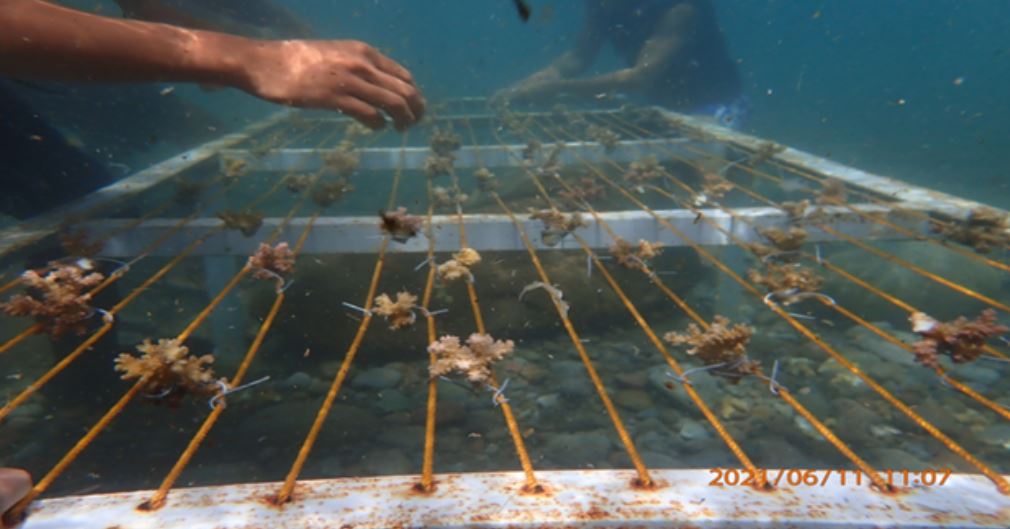
To rejuvenate marine life in the waters off Marinduque, a province-wide coral restoration project was initiated by the Department of Science and Technology (DOST) through the DOST-MIMAROPA regional office poised to help local fisherfolks secure their livelihood.
The project to restore the coral reefs in the said area is implemented in collaboration with the Provincial Government of Marinduque, the Bureau of Fisheries and Aquatic Resources (BFAR), other local government units (LGUs), and local fisherfolk groups.
The project started off with the deployment of the coral transplantation technology off the coast of Buenavista, Marinduque. This is the first large-scale restoration effort in the MIMAROPA region that seeks to reverse reef degradation and improve the productivity of marine resources.
A total of 10 Coral Nursery Units (CNUs) are already established in the Marine Protected Areas of Tungib-Lipata in Buenavista last 10-11 June 2021 and another 10 CNUs in Poctoy, Torrijos this 22-23 June 2021.
CNUs are used to facilitate the growth of the asexually reproduced corals, which are live coral fragments also known as the “corals of opportunity” (COPs) dislodged from a colony through the natural process of fragmentation. CNUs are set up 25 feet underwater and each is designed to hold 500 COPs per batch several times a year.
The technology was developed by the University of San Carlos (USC) under the Filipinnovation on Coral Reef Restoration Program of the DOST- Philippine Council for Agriculture, Aquatic and Natural Resources Research and Development (DOST-PCAARRD).
In 2018, the DOST-MIMAROPA initiated the assessment of coral reef areas in Marinduque through the adoption of the Automated Rapid Reef Assessment System (ARRAS) that successfully generated a comprehensive report and maps of the coral reef and seagrasses. ARRAS is a program for coral reef monitoring developed by the University of the Philippines-Diliman (UP-Diliman) and funded by the DOST.
The long-term monitoring project revealed that there are already major areas in the province where live coral cover is almost non-existent due to siltation and sedimentation along the coast. Hence, high priority for management and protection efforts were recommended for the degraded areas.
To ensure a holistic approach in addressing the problem, DOST-MIMAROPA initiated a collaboration with different stakeholders from concerned government agencies and communities. The provincial offices of BFAR and the Department of Environment and Natural Resources (DENR) conducted their monitoring and evaluation and provided pertinent data for the project as well as the necessary permits. Meanwhile, the Provincial Government of Marinduque and Marinduque State College (MSC) provided experts for the installation, monitoring, and maintenance of the CNUs and also shouldered the necessary training expenses.
On the other hand, DOST-MIMAROPA spearheaded the procurement and deployment of CNUs, provided technical diving experts, conducted periodic monitoring and evaluation of the coral’s growth and survivorship, and will conduct forums and other information awareness activities. It also ensures that the communities are involved in the activities—from the planting of coral fragments to the setting up of CNUs.
By the end of July 2021, the technology will be deployed in all six municipalities of Marinduque.
Coral reef and fish populations in Sorsogon were also seen to increase amidst the Covid 19 pandemic in 2020.
Good News Pilipinas is celebrating its 15th Anniversary in 2021 by giving away prizes! Subscribe to our Good News Pilipinas! TV YouTube channel and enter the raffle by sending us an email to editor@goodnewspilipinas.com
The post Coral reef restoration in Marinduque seen to improve marine resources appeared first on Good News Pilipinas.
Source: Good News Pilipinas
0 Comments